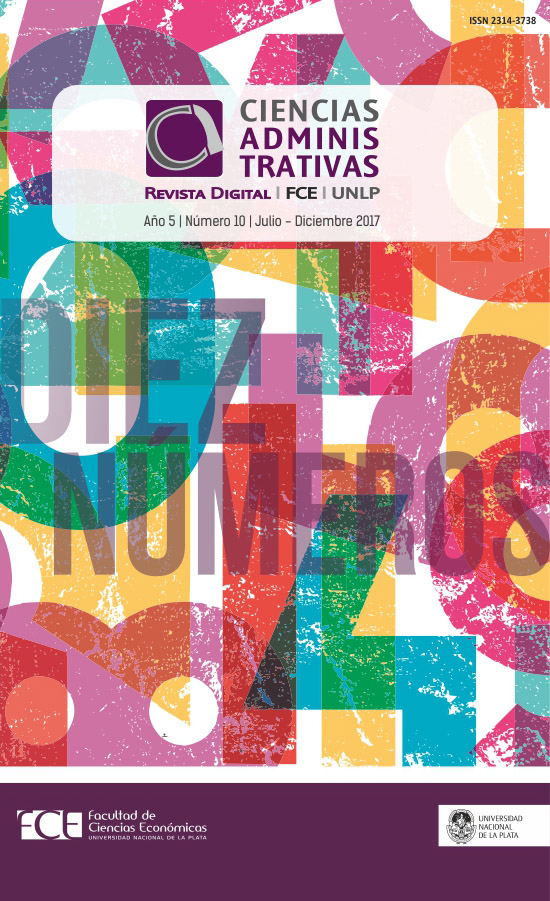Leadership and ethics. Neutrality does not exist
DOI:
https://doi.org/10.24215/23143738e012Keywords:
Leadership an ethics, ethics in leadership, negative leadership, unethical leadershipAbstract
The aim of this work is to review the neutral way of how certain leadership models are designed, transmitted, accepted and practiced in organization management fields. Such neutrality implies a framework that suspends the definition and assessment of principles and values as well as their impacts. This apparent neutrality extends through all description and normative of models and naturally leads to a practice with no ethical assessment or social responsibility. In largely management bibliography, the aim of leadership study is the performance by more and better results. Equifinality makes the leader's form of influence to remain in the background while leading to the desired results. From the analysis of a widely spread leadership model, it will be proposed below the study of ethical risks from several authors’ work striving to discuss the apparent neutrality of principles and values.
Downloads
Metrics
References
Borgeaud-Garciandia, N. (2010) “Nueva organización del trabajo y suicidios: ¿Una Fatalidad?” Trabajo y Sociedad, XIV (3).
Brown, M. y Treviño L. “Ethical leadership: A review and future directions”. The Leadership Quarterly, 17 (2006), 595-616.
Brown, M., Treviño, L. y Harrison D. (2005) “Ethical leadership: a social learning perspective for construct development and testing”. Organizational Behavior and Human decision Processes, 97, 117-134.
Carsten, K. y Uhl-Bien, M. (2013) “Ethical Followership: An Examination of Followership Beliefs and Crimes of Obedience”. Journal of Leadership & Organizational Studies, 20-49.
Den Hartog, D. y Belschak, F. (2012); “Work Engagement and Machiavellianism in the Ethical Leadership Process”. Journal of Business Ethics, nro. 107, 35-47.
De Hoogh, A. y Den Hartog, D. (2008) “Ethical and despotic leadership, relationship with leader's social responsability, top management team effectiveness and subordinates' optimism: A multi-method study”. The Leadership Quarterly, nro. 19, 297-311.
Goleman, D. (2005) “Liderazgo que logra resultados” Harvard Business Review, 83(11), 109-122.
Molthan-Hill, P. (2014) “The moral muteness of managers: An anglo-American phenomeno? German and British managers and their moral reasoning about enviromental sustainability in business”. International Journal of Cross Cultural Management 14 (3), 289-305.
Raineri B., Andrés. (2006) “Estilos de dirección como determinantes del clima laboral en Chile”. Revista ABANTE, 9 (1), 3-33).
Stachowicz-Stanusch, A. (2011) “Destructive sides of Charismatic Leadership”. Zarsadzania Zasobami Ludzkimi . Instytut Pracy i Spraw Socjalnych, (6) -, 113-125.
Treviño, Brown, Pincus Hartman, (2003), “A Qualitative Investigation of Perceived Executive Ethical Leadership: Perceptions from Inside and Outside the Executive Suite”, Human Relations - The Tavistock Institute. Volumen 56, 5-37.
Walumba, F., Mayer, D., Wang, P., Wang, H., Workman, K., Christensen, A. (2011) “Linking ethical leadership to employee performance: The roles of leader-member exchange, self-efficacy, and organizational identification”. Organizational Behavior and Human Decision Processes, 115 204-213.
Zehir, C. y Erdogan, E. (2011); “The Association between Organizational Silence and Ethical Leadership trough Employee Performance”. Procedia Social and Behavioral Sciences, 24, 1389-1404.
Downloads
Additional Files
Published
How to Cite
Issue
Section
License
Those authors who have publications with this journal, agree with the following terms:
a. Authors will retain its copyright and will ensure the rights of first publication of its work to the journal, which will be at the same time subject to the Creative Commons Atribución-NoComercial-CompartirIgual 4.0 Internacional (CC BY-NC-SA 4.0) allowing third parties to share the work as long as the author and the first publication on this journal is indicated.
b. Authors may elect other non-exclusive license agreements of the distribution of the published work (for example: locate it on an institutional telematics file or publish it on an monographic volume) as long as the first publication on this journal is indicated,
c. Authors are allowed and suggested to disseminate its work through the internet (for example: in institutional telematics files or in their website) before and during the submission process, which could produce interesting exchanges and increase the references of the published work. (see The effect of open Access)





































